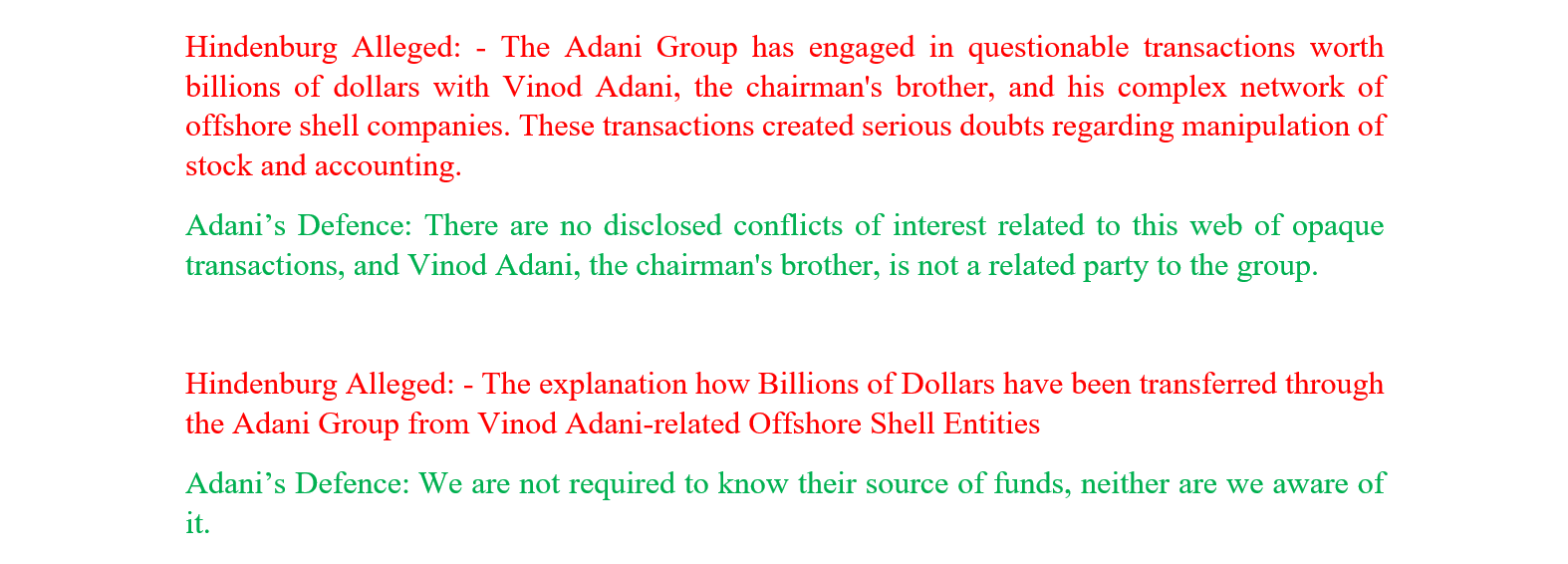On January 24th, the US-based financial research company Hindenburg charged Adani of engaging in “the biggest swindle in business history” through “brazen stock manipulation and accounting fraud scheme.” According to the paperwork from the short seller, Adani inflated the share prices of its units artificially by investing money in the equities through offshore tax havens. Hindenburg said that the organization profited from a “decades-long pattern” of tolerance from the government and that “investors, journalists, people, and even politicians have been unwilling to speak out for fear of punishment.”
Let’s examine the fundamentals of Hindenburg. Nate Anderson, CFA, CAIA, founded it. Forensic financial research is the area of expertise of Hindenburg Research. they have decades of expertise in the investment management sector, historically specializing in equities, credit, and derivatives analysis. They employ basic analysis to help them make investment decisions, and they think the most useful research comes from locating obscure data from unusual sources. They frequently search for situations where a company may have a variety of accounting irregularities, bad actors in key management or service provider roles, undisclosed related-party transactions, unethical or illegal business or financial reporting practices, or undisclosed regulatory, product, or financial issues.
The Hindenburg searches the market for potential man-made catastrophes and seeks to bring them to light before they claim more innocent lives. They published a report on multiple allegations of fraud at the Adani Group, the second-largest conglomerate in India and the third-richest person in the world at the time, on January 24th. Adani responded to the findings with a “413-page rejoinder.” They were referred to as the “Madoffs of Manhattan” in the spectacular opening statement.
Additionally, Adani said that Hindenburg had broken “relevant securities and foreign currency rules” flagrantly. This is another significant claim that Adani absolutely denies, despite the fact that they have not identified any such legislation.
According to Hindenburg, the Adani group also attempted to divert attention from the important issues at hand and instead fuelled a nationalist narrative by asserting that our findings amounted to a “planned attack on India.” In essence, the Adani Group has made an effort to link the prosperity of India with its own rise to prominence and the fortune of its chairman, Gautam Adani.
Hindenburg holds the opinion that fraud is a fraud, regardless of who is committing it—even one of the world’s richest people. Hindenburg asserted that just roughly 30 of Adani’s 413-page response’s substantive pages dealt with topics pertinent to the 109-page study. The remainder of the response was made up of 53 pages of high-level financial information, general information, and details on irrelevant corporate initiatives, like how it supports female entrepreneurship and the production of safe vegetables, along with 330 pages of court records and other court-related information.
Adani Group issued a 413-page statement in response to the damning study, dismissing the allegations as a “maliciously wicked” reputational attack. The comments of a company thousands of kilometers abroad with no credibility or ethics have had a substantial and unheard-of negative impact on our investors, the Adani Group claimed. Gautam Adani reassured investors last week, stating that “fundamentals of our firm are quite solid, our balance sheet is sound, and our assets are robust,” as Adani group stocks continued to reach fresh lows in the wake of the Hindenburg report. On Friday, he told India Today television that “these accusations are unfounded.”
On Wednesday, shares of the Adani Group rose for a second straight day. Adani Enterprises, the flagship company of the Gautam Adani-led conglomerate, soared 11% higher than the Nifty 50 index, while shares of Adani Ports and Special Economic Zone also were among the top gainers in early trade, surging over 8%. The market capitalization of the Adani group firms has recovered over the previous several sessions after dropping by almost $120 billion as a result of allegations of accounting fraud made by short-seller US investment organization Hindenburg Research. The loss has been reduced to less than $110 billion thanks to the increase in two straight sessions. The increase followed the organization’s announcement that it was repaying early debts totaling $1.1 billion.
Adani Transmission shares increased 4.87% to ₹ 1,312.70, while the price of Adani Enterprises shares reached the 10% upper circuit limit at ₹ 1,982.75. The business announced a 73% increase in consolidated net profit at ₹ 478 Crores for the December quarter. After the company’s consolidated earnings more than quadrupled to ₹ 103 Crores in the December quarter, Adani Green Energy shares rose 2.48% to ₹ 864.10. Shares of Adani Wilmar reached its 5% upper circuit limit at ₹ 419.35, while those of Ambuja Cements rose 2.27%.
The share price of Adani Enterprises has increased 101% after reaching a 52-week low on February 3rd. The stock is presently 51% below the 52-week high it reached in December of last year. Shares of Adani Ports have increased by 50% since their 52-week low on February 3rd. It is now trading 40% below the 52-week high reached in September of last year. Adani Total Gas is still down 65% from the ₹ 3,998 it paid on January 23rd, 2023, for a 52-week period.
The share price of Adani Power has increased by 7% after it recently hit a low of ₹ 170. However, the stock is currently trading 33% below its 24th January closing price, when Hindenburg issued its analysis. From their 52-week lows reached this week, the shares of Adani Transmission and Adani Green Energy have increased by roughly 10% and 7%, respectively. The share price of Adani Wilmar has since increased 16% from its most recent low.






